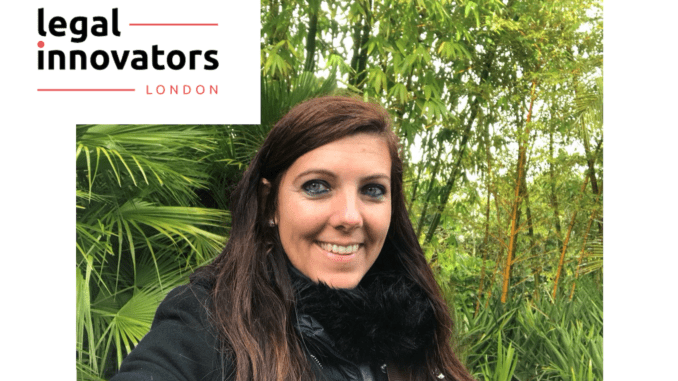
‘We are in a new legal era and it’s thrilling! Imagine how many hours and resources we can save using AI for daily business legal needs,’ says Isabel Cervantes, an expert in legal innovation at global carmaker Volkswagen.
‘Imagine how data analytics managed by the legal teams can be used to predict future class actions or claims, allowing for proactive risk management and strategic planning,’ she adds. And this site would absolutely have to agree with this assessment.
Isabel is just one of the many great speakers at the Legal Innovators UK conference in London on November 8 + 9. Artificial Lawyer asked her some more about her role and her views on the current changes in the market.
—
What is your role and how did you get into this field?
My role is to make the legal life of my colleagues easier. Group Innovation is Volkswagen’s cutting-edge arm, shaping the challenge of the future of mobility, leading the innovation fields of artificial intelligence, sustainable solutions and autonomous driving, among others. I am in charge of solving all legal issues facing Volkswagen Group Innovation.
I got into this field thanks to an International Impact Manager Program (because I came from SEAT-CUPRA, a Volkswagen Group brand based in Spain) and thanks to the future vision of my amazing boss, the Executive Director of Group Innovation.
How much has your role changed in the last five years, and how much do you think it will change in the next five years?
My position at Volkswagen was created just two years ago. In my opinion, it’s absolutely necessary that companies implement legal solutions to help the profitability of the business.
In the field of research you must be really fast if you want to be competitive. You should not allow a research project to slow down because the legal teams are under water and have not been fast enough.
It’s a long way to go, but the legal needs of big industries should be managed faster and more effectively. And the good thing is there are already interesting solutions in the market for helping to achieve this goal, but companies need to be prepared to implement them: this is the hardest part from my point of view. My hope is that in the next five years these solutions and a new way of working will be in use.
Do you think that we have reached a ’new era’ for legal innovation, with forces such as generative AI, standardisation and rethinking legal work, catalysing real change?
Yes, for sure we are in a new legal era and it’s thrilling! Imagine how many hours and resources we can save using AI for daily business legal needs. Imagine how data analytics managed by the legal teams can be used to predict future class actions or claims, allowing for proactive risk management and strategic planning.
There is a new market which is offering legal tech solutions that enables the companies to increase their profits and enhance the business. And I would say not just the financial and business needs can be improved, the sustainability and corporate governance can also be a key focus.
If companies are not skilled enough or sufficiently prepared to adapt to this new legal revolution in the fast-paced environment we live, these companies may miss the boat.
From an inhouse perspective, do you feel the balance of power is shifting more to the clients now as inhouse legal teams grow in size?
It’s a fact that if in-house legal teams grow in size and capability, linked to the increasing adoption of legal technology and tools, they will be empowered to manage their workload more efficiently and they will reduce the need for outsourcing.
However, in my opinion there are multiple factors to be considered, such as the kind of industry, the size and maturity of the legal department or the specific legal issues they need to handle. My forecast is the external law firms may still hold significant influence due to their specialized expertise or the high complexity of some legal matters.
How much has improving KM and data analytics inside the business helped your legal team?
One of the main advantages I see is the efficiency and the cost reduction. KM systems allow our legal team to centralize and organize legal knowledge, documents, templates, and precedents. This helps by saving time when searching for information, drafting documents from scratch, or engaging external counsel unnecessarily.
For us it is really important to use standardized templates aligned previously with all the relevant areas (e.g. export controls or tax) to ensure consistency in legal work, reducing the likelihood of errors and improving the quality of legal services.
And finally, if you had one message you’d like to share about how to achieve successful change management in relation to legal innovation, what would it be?
Change is a constant in the business environment. Legal frameworks, driven by the relentless evolution of regulations and technology advancements, are a great challenge that we must manage. To navigate this landscape successfully, legal professionals, from leadership to support staff, must cultivate a culture that values continuous learning, adaptation, and innovation.
It’s necessary to have an urgent change of mindset and see legal innovation as an advantage and not as a hurdle. It is as important for the legal team to reach such goals as for the rest of the commercial or financial teams. But, only when a company’s culture embraces legal innovation with an open mind will it work.
Thanks Isabel! Looking forward to hearing you speak at Legal Innovators in London.
—
Legal Innovators UK Conference – November 8 + 9 – London
The Legal Innovators UK conference, where Isabel and many other great speaker are attending, will take place on 8 + 9 November. Day One: law firms and ALSPs, Day Two: inhouse and legal ops.
For tickets, please see here.
For more information, please see here.
The two-day event comes at a time of significant change for the legal market and we will be bringing you engaging panels and presentations where leading experts really dig into the issues of the day, from generative AI, to the evolution of ALSPs, to law firm innovation teams in this new era for legal tech, to how empowered legal ops groups and pioneering GCs are making a real impact.
See you there!
Richard Tromans, Founder of Artificial Lawyer and Conference Chair.
